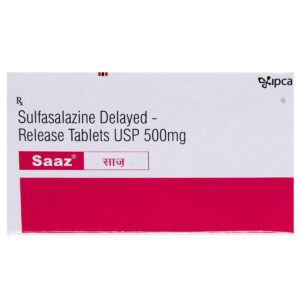SULFASALAZINE
SULFASALAZINE: Sulfasalazine is a medication commonly used for the treatment of inflammatory bowel disease, including ulcerative colitis and Crohn’s disease. It belongs to a class of drugs called aminosalicylates.
The mechanism of action of sulfasalazine is not fully understood, but it is thought to work by reducing inflammation in the colon and intestines. The drug is composed of two components: sulfapyridine and 5-aminosalicylic acid (5-ASA). The 5-ASA component is believed to have anti-inflammatory effects, while the sulfapyridine component helps deliver the 5-ASA to the colon.
The dose of sulfasalazine depends on the condition being treated. For ulcerative colitis, the typical dosage ranges from 2 to 4 grams per day, divided into multiple doses. For rheumatoid arthritis, the dosage can range from 1 to 3 grams per day. It is important to follow the prescribed dosage and consult a healthcare professional for specific instructions.
As with any medication, sulfasalazine can cause side effects. Common side effects include nausea, vomiting, headache, loss of appetite, and gastrointestinal disturbances such as abdominal pain, gas, and diarrhea. In some cases, sulfasalazine can cause a rash, which may be a sign of an allergic reaction. More serious side effects, although rare, may include liver problems, blood disorders, and allergic reactions affecting the lungs or kidneys.
It is important to note that sulfasalazine can interact with other medications, so it is crucial to inform your healthcare provider about all the medications you are taking to avoid any potential drug interactions.
Overall, sulfasalazine is an effective medication for the treatment of inflammatory bowel disease, but it is essential to be aware of potential side effects and follow healthcare provider’s instructions closely.

